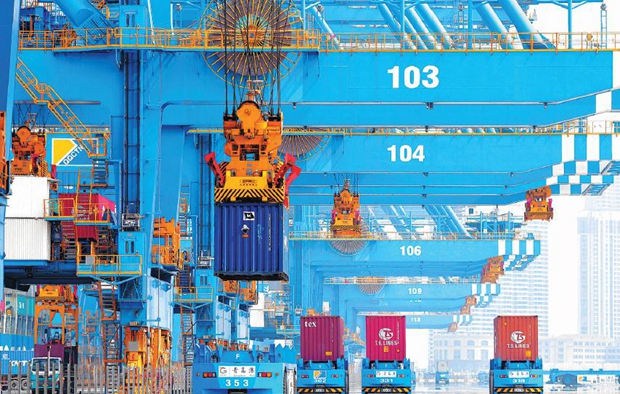Qingdao, Japan ink deals worth $491m despite COVID-19

Containers are unloaded at Qingdao Port in Shandong province in March. [Photo by
Yu Fangping / For China Daily]
Officials and businesspeople from China and Japan have expressed confidence in further enhancing bilateral economic ties despite the COVID-19 pandemic, with the signing of 20 cooperative projects valued at 3.5 billion yuan ($491 million) in Qingdao, Shandong province, last week.
The projects were mainly in areas including e-commerce, banking, legal consulting, healthcare and intelligent precision testing equipment research and development.
A new Belt and Road-themed online shopping mall project is a cross-border $45 million business platform aiming to bringing quality made-in-Japan products to China as well as economies involved in the initiative, said Yoneyma Kiyoshi, legal person for the project.
The Qingdao-Japan International Business Club, a new platform specially designed for facilitating the potential Japan-related projects, enterprises and business associations entering the Chinese market-as well as Chinese investment in Japan-was also launched on May 19.
Located in the Qingdao International Economic Cooperation Zone in the West Coast New Area, the club consists of a newly-built 3,000-square-meter service hall and a demonstration zone promoting regional development and cooperation between Qingdao and Japan.
The hall includes functional zones for exhibitions, conferences and administrative work. It will help boost project pairing activities and facilitate investment and business from Japanese companies.
The demonstration zone, which was approved by the National Development and Reform Commission earlier this month, will be jointly designed by Mitsubishi Jisho Sekkei, a Japanese architecture firm, and Nomura Research Institute, a think tank and systems integrator from Japan.
Focusing on developing material science, energy technology, bioengineering, information communications and modern services, the demonstration zone is designed to be an eco-friendly, intelligent and open community of shared interests.
The basic infrastructure of the zone is expected to be completed by 2025. Local officials are also expecting the zone to house more than 200 enterprises and create some 35,000 jobs.
"The Qingdao-Japan International Business Club is determined to promote the gathering and coupling of all related resources, multiply their values and become an appealing platform for China-Japan cooperation-not only for Qingdao but for Shandong province and North China," said Wang Qingxian, Party secretary of Qingdao. "It will also foster new advantages in Qingdao's opening-up."
Along with the unveiling of the platform, the location of the secretariat of the Qingdao-Japan Entrepreneurs' Association was also launched.
Igawahara Masaru, consul-general of the Japanese consulate in Qingdao, spoke highly of the establishment of the business club and the role of the secretariat.
"The events are significant for us who wish to deepen China-Japan relations," said Igawahara. "The platforms inject new vitality and serve as a starting point for the two sides to resume exchanges and cooperation that have been delayed or canceled because of the COVID-19 pandemic."
Qingdao has a geographical advantage as it faces Japan across the sea. As the third largest of the city's trading partners, Japan has 2,147 investment projects in the city, with paid-in foreign investment of $5.95 billion by the end of March.
Matsumura Toshiko, director-general of the Japan External Trade Organization (JETRO) Qingdao, said the city is a hot spot city for Japan investment, with the number of visiting Japanese for both business and tourism on the rise in recent years.
The China (Shandong) Pilot Free Trade Zone was officially approved by the State Council in August, in which the Qingdao area took up the largest share. Among 112 pilot projects for the Shandong FTZ, 106 will be implemented in the Qingdao area.
"With more support from the central and provincial-level governments being given to Qingdao, we are expecting more cooperation in more active ways and areas to achieve win-win results," Matsumura said.










 Play
Play  Play
Play